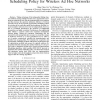Free Online Productivity Tools
i2Speak
i2Symbol
i2OCR
iTex2Img
iWeb2Print
iWeb2Shot
i2Type
iPdf2Split
iPdf2Merge
i2Bopomofo
i2Arabic
i2Style
i2Image
i2PDF
iLatex2Rtf
Sci2ools
117
click to vote
GLOBECOM
2007
IEEE
2007
IEEE
Graph Theoretical Analysis of Opportunistic Scheduling Policy for Wireless Ad Hoc Networks
— 1 Taking advantage of the independent fading channel conditions among multiple wireless users, opportunistic transmissions schedule the user with the instantaneously best condition and thus increase the spectrum utilization efficiency of wireless networks. So far, most proposed opportunistic scheduling policies for wireless ad hoc networks exploit local multiuser diversity, i.e., each transmitter selects its best receiver independently. However, due to co-channel interference, the decisions of neighboring transmitters are highly correlated. Furthermore, the neighboring links without a common sender also experience independent channel fading. Taking the contention relationship and the channel diversity among links into account, we extend the concept of multi-user diversity to a more generalized one, by which a set of senders cooperatively schedule the instantaneously and globally best out-going links. We formulate the cooperative and opportunistic scheduling problem with fairness r...
GLOBECOM 2007 | Opportunistic Scheduling | Opportunistic Scheduling Policies | Opportunistic Scheduling Problem | Telecommunications |
Related Content
| Added | 02 Jun 2010 |
| Updated | 02 Jun 2010 |
| Type | Conference |
| Year | 2007 |
| Where | GLOBECOM |
| Authors | Qing Chen, Fei Ye, Zhisheng Niu |
Comments (0)

